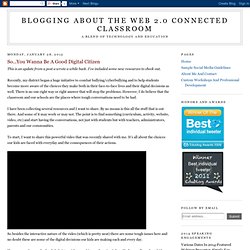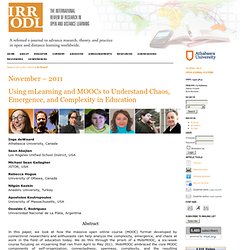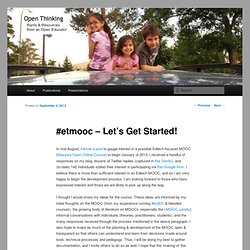

So...You Wanna Be A Good Digital Citizen. This is an update from a post a wrote a while back.

I've included some new resources to check out. Recently, my district began a huge initiative to combat bullying/cyberbullying and to help students become more aware of the choices they make both in their face-to-face lives and their digital decisions as well. There is no one right way or right answer that will stop the problems. However, I do believe that the classroom and our schools are the places where tough conversations need to be had. I have been collecting several resources and I want to share. To start, I want to share this powerful video that was recently shared with me. So besides the interactive nature of the video (which is pretty neat) there are some tough issues here and no doubt these are some of the digital decisions our kids are making each and every day.
How can teachers and schools help? There are lots of curricula out there to use in the classroom.You can do a quick search and find lots of free (and paid) stuff. Using mLearning and MOOCs to understand chaos, emergence, and complexity in education. Inge deWaard Athabasca University, Canada Sean Abajian Los Angeles Unified School District, USA Michael Sean Gallagher JSTOR, USA Rebecca Hogue University of Ottawa, Canada Nilgün Keskin Anadolu University, Turkey Apostolos Koutropoulos University of Massachusetts, USA Osvaldo C.

Abstract In this paper, we look at how the massive open online course (MOOC) format developed by connectivist researchers and enthusiasts can help analyze the complexity, emergence, and chaos at work in the field of education today. Keywords: Mobile technology; complexity; mLearning; MobiMOOC; MOOC; collaborative learning; chaos theory; emergence Introduction In December 1972, Edward Lorenz presented a paper to the National Academy of Sciences in New York, titled "Predictability: Does the Flap of a Butterfly’s Wings in Brazil Set off a Tornado in Texas? " In the reality of the 21st century’s second decennium, education is molded by a variety of new factors. Research Methodology. A MOOC about educational technology & media – Coming January 2013. #etmooc – Let’s Get Started!
In mid-August, I wrote a post to gauge interest in a possible Edtech-focused MOOC (Massive Open Online Course) to begin January of 2013.

I received a handful of responses on my blog, dozens of Twitter replies (captured in this Storify), and (to-date) 142 individuals stated their interest in participating via this Google form. I believe there is more than sufficient interest in an Edtech MOOC, and so I am very happy to begin the development process. I am looking forward to those who have expressed interest and those we are likely to pick up along the way. I thought I would share my ideas for the course. These ideas are informed by my initial thoughts on the MOOC (from my experience running #eci831 & blended courses), the growing body of literature on MOOCs (especially the cMOOC variety), informal conversations with individuals (theories, practitioners, students), and the many responses received through the process mentioned in the above paragraph.
Ideas will be shared below.